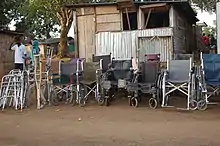Disability in Liberia
People with disability in Liberia face many challenges. The cultural attitude towards disability in Liberia is largely negative. Often, it is seen as the result of witchcraft or as punishment for a person's behavior. However, the government and non-governmental organizations (NGO) are working towards a more inclusive country for people with disabilities.
Demographics
Statistics from 2008 show that around 14 percent of the population of Liberia has a disability.[1]
Causes
The Second Liberian Civil War caused various types of disability to as many as 800,000 people.[2] Many people in Liberia have congenital conditions, but others become disabled due to birth trauma.[3]
Policy
The government of Liberia has stated that it has a commitment to providing an inclusive society for people with disabilities.[4] In 2005, Liberia created the National Commission on Disabilities.[3] Liberia signed and ratified the Convention on the Rights of Persons with Disabilities in 2012.[2]
Liberia has various protections for people with disabilities in the workforce.[5] The government also promotes tax incentives for hiring people with disabilities and has a target of 4% employment for people with disabilities.[5]
People with disabilities have received less attention than other groups of people who are at risk in the country.[6]
Non-governmental organizations
Non-governmental organizations (NGO) in the country have called on the government to secure the rights of people with disabilities.[7] Many of these groups have adopted a National Action Plan for the Inclusion of Persons with Disabilities.[7] NGOs advocating for people with disabilities became more involved in the process of advocacy following the 2005 elections in Liberia.[8]
Humanity & Inclusion has been working in Liberia since 2000.[1] The National Union of the Disabled (NUOD) was established in 2009 to advocate for people with disabilities in Liberia.[9] Other prominent NGOs in Liberia include the Disabled Females International-Liberia (ADFI), Organisation for the Social Integration of the Liberian Deaf (OSILD), Liberia National Association of the Blind (LNAB) and the Christian Association of the Blind-Liberia (CAB).[9]
Education
New residential schools for the blind are being constructed in Montserrado County.[10]
Accessibility

There is a lack of physical accessibility in Liberia.[3] Many government buildings do not have ramps and there are not enough sidewalks in cities.[3]
Cultural attitudes
People with disabilities in Liberia often face discrimination and marginalization.[1] There is a tradition of believing that a family has been subject to witchcraft when a child with disabilities is born and the family may be shunned and the child subject to cruel treatment.[11]
Disabilities that were caused by war are also stigmatized.[3] These can be mental disabilities, such as posttraumatic stress disorder (PTSD) or physical disabilities, such as amputations.[3]
Sport
Many of the members of the Liberian amputee football team were once former child soldiers.[12] Liberia participated in the first All African Amputee Football Tournament in 2007 which was sponsored by FIFA and held in Sierra Leone.[13] After the tournament, Liberia along with Ghana and Sierra Leone formed the African Nations Amputee Football Federation (AFFA).[13]
References
- "Liberia". HI. Retrieved 2020-07-07.
- SIDA 2014, p. 1.
- Van Aperen, Faustina (2019-04-04). "Liberia: Trade union actions on decent work for people with disabilities". PSI. Retrieved 2020-07-06.
- "Government of Liberia Committed to Ensuring Inclusive Society--Develops Policies and Programs for People with Disabilities". Liberia Permanent Mission to the UN. 11 June 2019. Retrieved 2020-07-07.
- SIDA 2014, p. 2.
- Carew, Mark T.; Colbourn, Tim; Cole, Ellie; Ngafuan, Richard; Groce, Nora; Kett, Maria (2019-07-17). Federici, Stefano (ed.). "Inter- and intra-household perceived relative inequality among disabled and non-disabled people in Liberia". PLOS ONE. 14 (7): e0217873. doi:10.1371/journal.pone.0217873. ISSN 1932-6203. PMC 6636711. PMID 31314807.
- "Liberia: Persons with Disabilities Want Inclusion". ReliefWeb. 14 July 2018. Retrieved 2020-07-06.
- Heymann, Jody; Cassola, Adele (2012-02-27). Making Equal Rights Real: Taking Effective Action to Overcome Global Challenges. Cambridge University Press. p. 41. ISBN 978-1-107-37831-5.
- SIDA 2014, p. 4.
- USAID n.d., p. 3.
- Gibbons, Geri (11 April 2016). "Friend recalls life of nun from Wilkes-Barre who helped the disabled in Liberia". The Times Leader. Retrieved 6 July 2020.
- "On Top of their Game". Jet. 111 (25): 50. 25 June 2007.
- Kallay, Allie (2007). "Disability Is Not Inability". New African (461): 65 – via EBSCOhost.
Sources
- SIDA (December 2014). "Disability Rights in Liberia" (PDF). SIDA.
- USAID (n.d.). "Better Educated Liberians" (PDF). USAID.